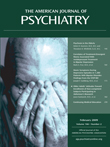Drs. Newman and Goldman Reply
To the Editor: We appreciate Dr. Tucker’s remarks about our commentary. He highlights the important distinction between those individuals with severe mental impairments who have ever been homeless and those who are homeless at a particular point. It is likely that those who have ever been homeless are homeless only briefly or episodically. However, the majority of severely impaired individuals who are homeless at a point in time are likely to be in the midst of a long spell of persistent homelessness. We agree that this distinction between those ever homeless and those homeless at any particular time is essential for understanding homelessness among this population and for policy development to address their needs. We also agree that addressing this problem requires systematically evaluating effective treatments and supportive services in independent settings, including assertive community treatment.



